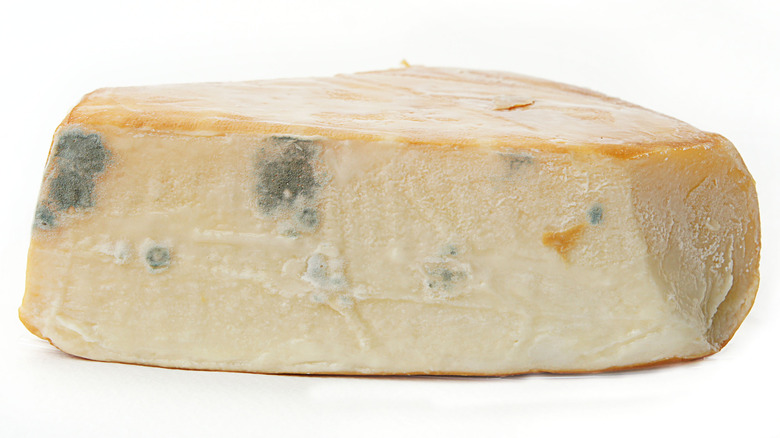How Bad Is It To Eat Moldy Cheese?
Cheese comes in all shapes, sizes, and flavors, ranging from sweet and creamy to sharp and salty. There's a widely held conception that cheese itself is a mold, but this is not the case. Cheese company and educational resource, The Cheese Grotto, explains that when it comes to mold, it can grow both internally and externally on cheese. Blue cheese is an example of an internally ripened cheese, as mold is incorporated into the milk used to make it. Brie cheese, on the other hand, is a type of externally ripened cheese. The mold that makes up the rind blooms on the outermost layer of the cheese.
The U.S. Department of Agriculture's Food Safety and Inspection Service states that of the thousands of species of mold that exist, these microscopic fungi can be found on both plant and animal matter — including food. Often taking the form of fuzzy growth, many types of mold produce spores and can establish "roots" deep within the food item itself. Some molds contain potentially harmful bacteria that can lead to foodborne illness if ingested. Knowing this, is it safe to eat cheese that has started to mold in the fridge?
Hard and soft cheeses will have different shelf lives
According to author and registered dietitian Natalie Rizzo, we want to be careful when it comes to mold. "Eating the wrong type of mold can cause allergic reactions or respiratory problems," Rizzo told Eat This, Not That! "Some molds produce mycotoxins, which can make you really sick." Salmonella and E.coli are two examples of the types of bacterial infections you can contract from eating potentially harmful molds (via the Mayo Clinic).
While it's generally encouraged by health experts to do away with any food items that have begun to mold, cheese may be the exception to the rule. According to the U.S. Department of Agriculture's Food Safety and Inspection Service, certain types of cheese are still A-OK to keep. Hard cheeses do not incorporate mold into the cheesemaking process and can still be eaten, as long as you cut off a 1-inch piece surrounding the mold and then store it in plastic wrap for safekeeping. Soft cheeses and internally ripened cheeses, however, are best discarded altogether, as they are more likely to contain harmful bacteria.
As per The Cheese Grotto, a good rule of thumb to stick to is that fresh cheese should be kept for no longer than a week, externally ripened cheeses have a shelf life of about a week or two, and any aged cheeses should be discarded after 2 weeks' time.

